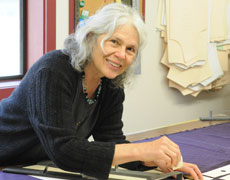This new textile library is a goldmine for sustainable clothing brands
Posted by Rose on 24th Apr 2020
With its vast collection of earth-friendly textiles, Re:Source in New York City is a must-visit destination for sustainable fashion brands
Last week I looked at some of the promising developments in the world of sustainable textiles including closed-loop fibers made from things like fruit byproducts and spoiled milk. As a follow-up, I want to share an interesting exchange between sustainable-fashion guru Elizabeth L. Cline and Tara St. James, who last year launched the United States’ first free-standing sustainable textiles library called Re:Source.
From raw materials to finished textiles, the Re:Source library collection is a hands-on heaven for sustainable clothing designers. [New Fashion Initiative]
A designer herself, St. James saw a need that all of us who create sustainable clothing share: a place to source textiles and yarns that are produced using earth-friendly cultivation and manufacturing processes. Reaching out to both larger names such as Stella McCartney and to less well-known designers, St. James has assembled a sizable collection all in one space so designers can get a hands-on feel for new style possibilities.
Asked what constitutes a truly sustainable material, St. James replies she’s not a purist when it comes to what’s included in the Re:Source collection. She goes on to say, "There’s pros and cons for material, so we try to remain flexible about what we include. So, if water conservation is really important to you as a brand or designer, then maybe cotton in any form is not the best choice and if you want natural fibers, you’d go more with hemp or linen or Tencel or Refriba for example. The whole landscape has to be understood in order to make those decisions. And that’s what we’re offering.”
The combination of hemp with Tencel in Lauren's Tuxedo Top is the sort of textile that Re:Source curator Tara St. James especially values.
When St. James is asked to name the most sustainable textiles in the library, she demurs, saying, "I also don’t think that there should be one clear solution because there needs to be diversity in the supply chain for purposes of farming and biodiversity in farming. If everybody decided to use organic cotton, we’d have a big problem. But just like if everybody decided to use recycled polyester, we’d still have a big problem. There needs to be encouragement for diverse material selection in design and also because it makes the world more interesting as far as clothing is concerned.
Tara St. James shares my optimistic outlook for sustainable fashion and fibers. She sees recycled fibers as an area of growing promise and is especially supportive of brands that consider the entire lifecycle of the clothing they make.
The next time I’m in New York, Re:Source will be at the top of my list of places to visit!
Share:


![From raw materials to finished textiles, the Re:Source library collection is a hands-on heaven for sustainable clothing designers. [New Fashion Initiative] From raw materials to finished textiles, the Re:Source library collection is a hands-on heaven for sustainable clothing designers. [New Fashion Initiative]](/product_images/uploaded_images/sustainable-fibers-library.png)

